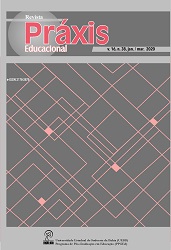BNCC IN CONTRACTING SOCIAL DEMANDS: PLANNING WITH AND PLANNING FOR
DOI:
https://doi.org/10.22481/praxisedu.v16i38.6012Abstract
This paper discusses the implementation of the Common National Curriculum Base (BNCC) and its misalignment with social demands, and presents two possible curricula: one that dislocates a “planning for”, that is, that vertically prescribes the pedagogical work for the school, and the curriculum that dialogues with the real that escapes it, allowing for “planning with”. The discussion proposed here also presents a clear position: to affirm the need for a basic content organization for national education, but not to join the regulatory instruments of pedagogical work, knowing that this is not possible without facing the social political aspect of which she is part. In this sense, through a qualitative approach, we visit what has been discussed about the BNCC and place it in the context of neoliberal policies, which more emphatically in recent years has put the educational policies demanded by society at a disadvantage. Thus, we take as essential the works of Cury (2018), Branco [et al.] (2018), Gonçalves (2018), Sacristán (2017), Sussekind (2014), Freire (1986), among others, that even from different perspectives, are of great contribution to the debate in the curriculum field, and we analyze data made available by the ministry of education via the internet on its official website. In dialoguing with the referenced framework, we perceive the existing BNCC as a prescribed form of curriculum and glimpse a basis that enables a collective and permanent construction.
Downloads
References
BRASIL. Documento final da 2ª Conferência Nacional pela Educação (Conae). Fórum Nacional de Educação (FNE), 2014. Disponível em: <http://fne.mec.gov.br/images/doc/DocumentoFina240415.pdf> Acesso em: 02/08/2019.
BRASIL. Constituição da República Federativa do Brasil de 1988. Presidência da República / Brasília, 5 de outubro de 1988. Disponível em: <http://www.planalto.gov.br/ccivil_03/constituicao/constituicao.htm> Acesso em: 02/08/2019.
BRASIL. Site do Ministério da Educação. Base Nacional Comum Curricular / 2019. Disponível em: <http://basenacionalcomum.mec.gov.br/>. Acesso em: 01/08/2019.
BRASIL. Lei de Diretrizes e Bases da Educação Nacional – LDBEN / LEI Nº 9.394 de 20 de dezembro de 1996. Disponível em: <http://portal.mec.gov.br/secad/arquivos/pdf/ldb.pdf> Acesso em: 02/08/2019.
BRASIL. Portaria nº 592, de 17 de junho de 2015. Ministério da Educação / Diário Oficial da União, 18 de junho de 2015, Seção 1, Página 16. Disponível em: <https://www.jusbrasil.com.br/diarios/94124972/dou-secao-1-18-06-2015-pg-16> Acesso em: 04/08/2019.
CURY, C. R. J. Base Nacional Comum Curricular: dilemas e perspectivas / Carlos Roberto Jamil Cury, Magali Reis, Teodoro Adriano Costa Zanardi. – São Paulo: Cortez, 2018.
GONÇALVES, R. M. Bricolagens praticadas e politicaspráticas de currículos nos cotidianos escolares / Tese (Doutorado) – Universidade do estado do Rio de Janeiro. Faculdade de Educação, 2018.
GOODSON, I. F. A construção social do currículo / Trad. Maria João Carvalho – Educa, Universidade de Lisboa, Lisboa, 1997.
SACRISTÁN, J. G. O currículo: uma reflexão sobre a prática / Trad. Ernani F. da Fonseca Rosa ; Revisão técnica: Maria da Graça Souza Horn. – 3. Ed. – Porto Alegre : Penso, 2017. 352 p.
SÜSSEKIND, M. L. As (im)possibilidades de uma base comum nacional / Revista e-Currículum, São Paulo, v.12, n.03, p. 1512 – 1529 / out,/dez.2014.
Downloads
Published
Issue
Section
License
Você é livre para:
Compartilhar - copia e redistribui o material em qualquer meio ou formato; Adapte - remixe, transforme e construa a partir do material para qualquer propósito, mesmo comercialmente. Esta licença é aceitável para Obras Culturais Livres. O licenciante não pode revogar essas liberdades, desde que você siga os termos da licença.
Sob os seguintes termos:
Atribuição - você deve dar o crédito apropriado, fornecer um link para a licença e indicar se alguma alteração foi feita. Você pode fazer isso de qualquer maneira razoável, mas não de uma forma que sugira que você ou seu uso seja aprovado pelo licenciante.
Não há restrições adicionais - Você não pode aplicar termos legais ou medidas tecnológicas que restrinjam legalmente outros para fazer qualquer uso permitido pela licença.












